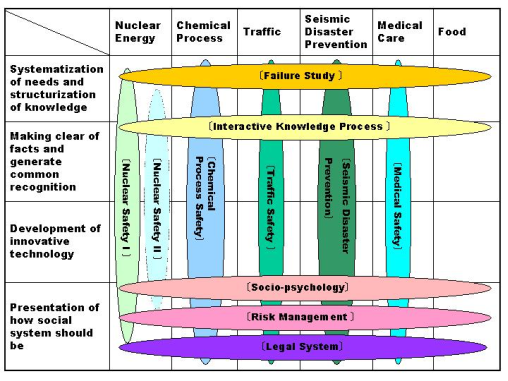Update: 2004/07/08
about Science and Technology for Society
about Mission-oriented Program I
Copyright (C) 2001-2003
S-Tech. All rights reserved.
Contact us:
s-tech@ohriki.t.u-tokyo.ac.jp
about Mission-oriented Program I
A mission considered important for the solution of social problems is set up first and a research team is organized to implement the study. The research on “Establishment of knowledge system for solution of social problems related to safety” has been started as the first mission since FY2001.
The purpose of the research is to establish a knowledge system for the realization of social system that should be aiming at the solution of social problems related to safety.
The research system consists of a ‘General Group’ that is engaged in
establishing a framework of knowledge system for the solution of social
problems related to safety and implementing researches in consolidation
and generalization of knowledge and a ‘Specific Problem Research Group’
that is engaged in providing insight into the knowledge system and also
implementing researches on specific problems to provide suitable solutions.
Director, Mission-oriented Program:
Hiroshi Komiyama Prof., School of Engineering, the University of Tokyo
The way how to proceed with the research on Mission-oriented Program
The research is proceeded through the methods shown below:
- ・Method 1:Systematization of needs and structurization of knowledge
- To systematize the needs (request for engineering) related to social problems on safety, and to structurize the knowledge responding to each of the needs so that it becomes possible to grasp the total image of complicated problems.
- ・Method 2:Making clear of facts and generate common recognition
- By listing up facts to be identified for the solution of problems, prioritizing them, making clear of the facts from those with higher priority down and providing the basis, generate common recognition and form basis for the social decision making on the selection and implementation of the solutions.
- ・Method 3:Development of innovative technology
- In advance to the solution of social problems related to safety, to develop technologies that incorporate innovation of social system.
- ・Method 4:Presentation of how social system should be
- With the results of methods 1 through 3 as presupposition, to present the form of social system that should be for the realization of society that is safe and in which people can live secured. In particular, to try to present the way how the social decision making/ implementation system should be and how the education/ social communication should be.
1.Research tasks that general research group carries out
General research group implements generalization of this mission-oriented
research related to safety, and establish a framework of knowledge system
for the solution of social problems related to safety and implement researches
in consolidation and generalization of knowledge as well. It also carries
out through the Individual Research Subgroup established under the General
Research Group the individual researches shown below:
- (1)General Rsearch Grouep
- Research on social communication tool for systematized needs, structurized knowledge and identified facts
- Leader:Hideyuki Horii(Prof., School of Engineering, the University of Tokyo)
- (2)Interactive Knowledge Process Research Group
- Research on establishment and demonstration of interactive knowledge process
- Leader:Toyoaki Nishida(Prof., Graduate School of Information Science and Technology, the University of Tokyo)
- (3)Traffic Safety Research Group
- Systematization of knowledge on traffic accidents and research on social system for the improvement of traffic safety
- Leader:Hironori Kato(Lecturer, Graduate School of Engineering, the University of Tokyo)
2.Research tasks to be carried out by Specific Problem Research Group
As for specific problem research, research has been initiated from FY2001 on the following specific research tasks.
- (1)Failure Study Research Group
- Research on establishment of Failure Study and presentation of failure learning type system
- Leader:Masayuki Nakao(Prof., Engineering Test Laboratory, the University of Tokyo)
- (2)Socio-psychology Research Group
- Research on development of equipment/technology of socio-psychology for the expansion of safety
- Leader:Koichi Okamoto(Prof., Dept. of Human Sciences, Toyo Eiwa University)
- (3)Nuclear Safety I Research Group
- Research on the comprehensive design of nuclear safety system
- Leader:Kazuo Furuta((Prof., Graduate School of Frontier Sciences, the University of Tokyo)
- (4)Nuclear Safety II Research Group
- Research on development of communication system for the security of safety
- Leader:Fumiya Tanabe(Senior Researcher, Dept. of Reactor Safety Research, Japan Atomic Energy Research Institute)
- (5)Seismic Disaster Prevention Research Group
- Research on seismic risk in the metropolitan area and disaster prevention/risk management technology
- Leader:Junji Kiyono(Associate Professor, Graduate School of Engineering, Kyoto University)
- (6)Chemical Process Safety Research Group
- Research on formation of social consensus on the safety of chemical process facilities〕
- Leader:Koji Matsuda(Advisor, Kashima Petroleum Co., Ltd.)
- (7)Medical Safety Research Group
- Systematization of knowledge by the evaluation system for the effectiveness/safety of medical treatment and research on improvement of safety of medical treatment
- Leader:Ryozo Nagai(Prof., Graduate School of Medicine and Head of University Hospital, the University of Tokyo)
- (8)Legal System Research Group
- Research on crosswise analysis and reconstruction of legal system related to securing safety
- Leader:Hideaki Shiroyama(Associate Professor, Graduate School of Law and Politics, the University of Tokyo)
- (9)Risk Management Group
- Research on development of risk management technology for the solution of social problems
- Leader:Masato Abe(Assistant Professor, Graduate School of Engineering, the University of Tokyo)
Positioning of research tasks of mission-oriented program
Research tasks are positioned in relation to the above four methods of research and research subject regions, as is shown in the following figure.
